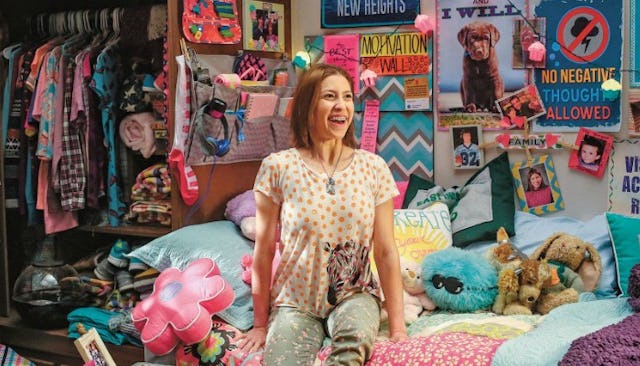The Blessing Of An Awkward Teen Phase (And How To Give Your Kids One)

It’s 1989. You are 14, flat-chested and bookish. You have frizzy, permed hair—frizzy because you didn’t know any better and faithfully brushed your newly spiraled hair every day for years. You have braces, and at night you wear medieval-looking orthodontic headgear. You are starting at a new high school where you know no one.
You would be me.
This kind of ugly duckling story is supposed to end with a swan, a glamorous finished product who goes to prom with the most popular boy in school or turns into Molly Ringwald or something. Me, I had (am still having?) a long, leisurely trip through Awkward. I ditched the perm and the braces, and I eventually hit puberty, but I remained bookish—okay, fine, super nerdy. While the dates ultimately came, I was still worlds from the popular girl that boys fought over.
And that’s OK. In fact, I wouldn’t want it any other way.
While other freshman girls, the ones who knew how to tease their bangs just right, were being asked out by senior boys, I was making close girlfriends. While popular girls were getting invited to parties and feeling enormous pressure to experiment with sex, drugs and alcohol, I had extra years to mature and get a good head on my shoulders before those things were even a possibility for me.
I spent time with my family, I read piles of books, I hung out with and laughed with friends, I played sports, and I studied hard. I was happy. I was able to be a kid, free from most of the peer pressure, because I was so far away from the possibility of popularity that I was left alone just to be. I figured out how to be me.
Now that I have my own children heading towards the tween and teen years, I’m hoping for a bit of awkwardness for them, too, a little cushion of time before the temptations and pressures of the risk-taking teenage years fully hit them. Time to develop dorky interests and tell stupid jokes with their friends instead of sexting and drinking and pretending that all this adult-ish stuff raining down on them doesn’t scare them.
Because it is scary. I remember a friend, one who’d been pressured to drink in the eighth grade with a group of friends, saying that as a young teen, she’d sometimes wished her parents had been stricter. She didn’t have awkwardness to protect her like I did; in my junior high, it was only the basketball players and cheerleaders drinking, so that wasn’t an issue for me. My friend hung out with a popular crowd, though. Without my cocoon of uncool, and without her parents placing firm limits, she was left vulnerable, and understandably, she gave in to the pressure.
As much as I might like to, I can’t guarantee my kids will be as uncool as their mama. So, what to do? I found answers in Lisa Damour’s Untangled: Guiding Teenage Girls Through the Seven Transitions Into Adulthood, a terrific new book on parenting teen girls that I recently reviewed. Untangled focuses specifically on girls, but much of its sound advice is just as applicable to our teen boys.
When peer pressures loom large, Damour advises avoiding extremes. If we threaten kids with dire punishments, are they really going to call us to pick them up from the party that’s gotten out of control? Nope, they’re going to stay there and remain in danger. Neither does Damour favor making BFFs with our teens and partying with them in hopes of keeping them safe.
Instead, Damour says, “the safest girls are the ones who can point to their parents’ ‘crazy rules’ to avoid risky behavior […] [W]hen her friends are around feel free to be as kind and engaging as your daughter can stand, but stay firmly in your role of boring middle-aged parent so that she can paint you as the bad guy when needed.” Then, at the party they can say, for example, that their mom can smell pot from a mile away and that mom will absolutely freak out and punish the hell out of them if they smoke it. Whether or not that’s technically true, we play the role of the no-fun adult, and the kid doesn’t lose face in front of his or her friends.
Essentially, we parents are not supposed to be cool. This job is perfect for me! Who knew, all those permed years ago, that I was actually in training for this most critical phase of my life? It’s the second coming of uncool, if you will.
Bring on the teen years, kids, and I’ll bring the nerdiness.
This article was originally published on